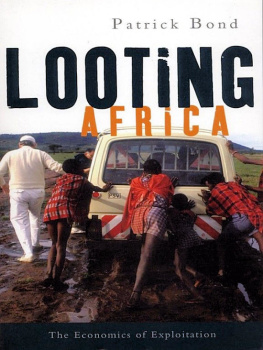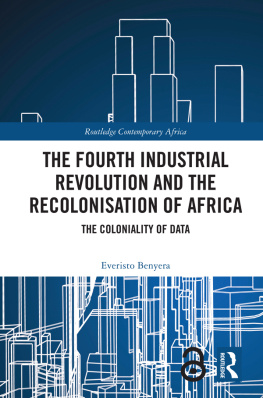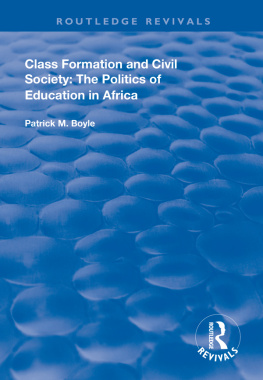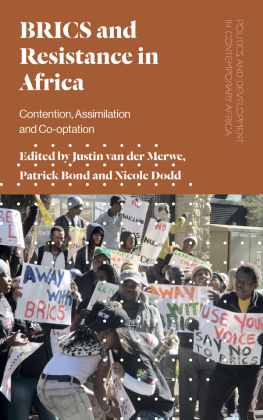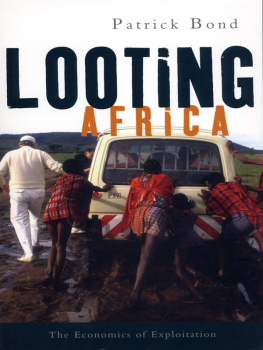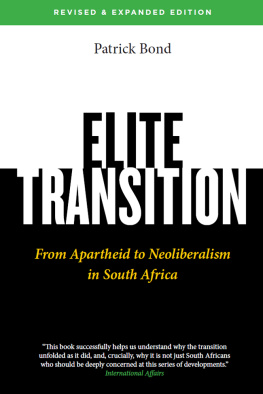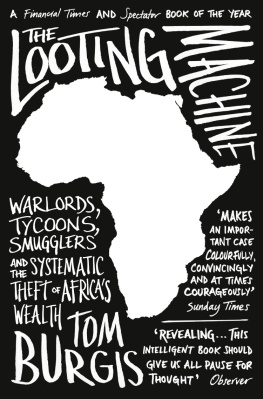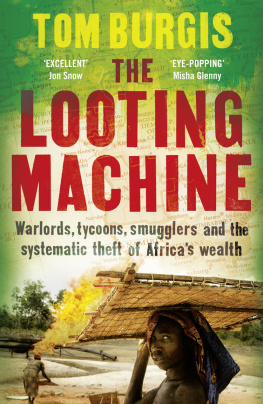Patrick Bond - Looting Africa: The Economics of Exploitation
Here you can read online Patrick Bond - Looting Africa: The Economics of Exploitation full text of the book (entire story) in english for free. Download pdf and epub, get meaning, cover and reviews about this ebook. year: 2006, publisher: Zed Books, genre: Politics. Description of the work, (preface) as well as reviews are available. Best literature library LitArk.com created for fans of good reading and offers a wide selection of genres:
Romance novel
Science fiction
Adventure
Detective
Science
History
Home and family
Prose
Art
Politics
Computer
Non-fiction
Religion
Business
Children
Humor
Choose a favorite category and find really read worthwhile books. Enjoy immersion in the world of imagination, feel the emotions of the characters or learn something new for yourself, make an fascinating discovery.
- Book:Looting Africa: The Economics of Exploitation
- Author:
- Publisher:Zed Books
- Genre:
- Year:2006
- Rating:5 / 5
- Favourites:Add to favourites
- Your mark:
- 100
- 1
- 2
- 3
- 4
- 5
Looting Africa: The Economics of Exploitation: summary, description and annotation
We offer to read an annotation, description, summary or preface (depends on what the author of the book "Looting Africa: The Economics of Exploitation" wrote himself). If you haven't found the necessary information about the book — write in the comments, we will try to find it.
Patrick Bond: author's other books
Who wrote Looting Africa: The Economics of Exploitation? Find out the surname, the name of the author of the book and a list of all author's works by series.
Looting Africa: The Economics of Exploitation — read online for free the complete book (whole text) full work
Below is the text of the book, divided by pages. System saving the place of the last page read, allows you to conveniently read the book "Looting Africa: The Economics of Exploitation" online for free, without having to search again every time where you left off. Put a bookmark, and you can go to the page where you finished reading at any time.
Font size:
Interval:
Bookmark:

ABOUT THE AUTHOR
Patrick Bond, a political economist, is research professor at the University of KwaZulu-Natal School of Development Studies in Durban where he directs the Centre for Civil Society (www.ukzn.ac.za/ccs). He is also visiting professor at York University Department of Political Science in Toronto and Gyeongsang National University Institute of Social Sciences in South Korea. He previously taught at the University of the Witwatersrand Graduate School of Public and Development Management, Yokohama National University Department of Economics and the Johns Hopkins University School of Public Health.
Bonds other recent books include Talk Left, Walk Right: South Africas Frustrated Global Reforms (published by Africa World Press and University of KwaZulu-Natal Press, 2006); Trouble in the Air: Global Warming and the Privatised Atmosphere (edited with Rehana Dada, published by the CCS and the Transnational Institute, 2005); Elite Transition: From Apartheid to Neoliberalism in South Africa (University of KwaZulu-Natal Press, 2005); Fanons Warning: A Civil Society Reader on the New Partnership for Africas Development (Africa World Press and CCS, 2005); and Against Global Apartheid: South Africa Meets the World Bank, IMF and International Finance (Zed Books and University of Cape Town Press, 2003). He was born in Belfast, Northern Ireland in 1961.

The Open Society Initiative for Southern Africa, who supported the publication of this book, is helping to build a region where economic growth primarily serves human development needs from food security to access to education and healthcare. OSISAs deliberate emphasis is on the importance of social and economic rights, in addition to civil and political liberties. OSISA works in nine Southern African Development Community countries: Angola, Mozambique, Botswana, Lesotho, Namibia, Swaziland, Zimbabwe, Zambia and Malawi.
OSISA supports the Publish What You Pay coalition of over 280 NGOs worldwide. This campaign aims to help citizens of resource-rich developing countries hold their governments accountable for the management of revenues from the oil, gas and mining industries. When properly managed these revenues should serve as a basis for poverty reduction, economic growth and development rather than exacerbating corruption, conflict and social divisiveness.
In addition, OSISA believes that the free flow of information is essential for the development of an open society. OSISA works to overcome the digital divide between the countries of the industrialized West and the developing world, and to further Africas participation in the information society. The Open Society Justice Initiative supports efforts not only to adopt freedom of information laws but also to implement and use disclosure tools once they are available. OSISA is pleased to support Zed Books in the wider distribution of Looting Africa throughout Africa, as part of this mission to further the dissemination of knowledge and ideas.
OSISA also celebrates the work of African scholars committed to economic justice. Guy Mhone (19432005) enjoyed a distinguished career as a development economist, both in North America and in Africa. He also worked as chief director for research at the Department of Labour in the first post-apartheid government in South Africa. He will be remembered for his books, including The Political Economy of a Dual Labour Market in Africa (1982) and The Informal Sector in Southern Africa (1997), in which he developed his theory of Africas dysfunctional enclave economies. His quiet dignity, great courage and powerful intellect are greatly missed by all those who work for a more equitable Africa.
Jos Negro (19562005), a Mozambican, worked as a development economist and economic historian for nearly three decades in Africa and in Europe. He helped to found and coordinate the Land Campaign and the Poverty Observatory, which in 2004 published the first Mozambique Annual Poverty Report. He served on OSISAs board until his untimely death.
PATRICK BOND


University of KwaZulu-Natal Press
PIETERMARITZBURG

Zed Books
LONDON AND NEW YORK
Looting Africa: The Economics of Exploitation was first published in 2006.
Published in South Africa, Lesotho, Swaziland, Botswana, Namibia and Zimbabwe by University of KwaZulu-Natal Press, Private Bag X01,
Scottsville 3209, South Africa
www.unpress.co.za
Published in the rest of the world by Zed Books Ltd, 7 Cynthia Street, London N1 9JF, UK, and Room 400, 175 Fifth Avenue, New York, NY 10010, USA
www.zedbooks.co.uk
This ebook edition was first published in 2013
Copyright Patrick Bond, 2006
The right of Patrick Bond to be identified as the author of this work has been asserted by him in accordance with the Copyright, Designs and Patents Act, 1988
Cover designed by Andrew Corbett
Set in 9/12.5 pt Georgia by Long House, Cumbria, UK
All rights reserved
No part of this publication may be reproduced, stored in a retrieval
system or transmitted, in any form or by any means, electronic or
otherwise, without the prior permission of the publisher.
A catalogue record for this book is available from the British Library
US Cataloging-in-Publication Data is available from the Library of Congress
ISBN 978 1 84813 728 8
Contents
FIGURES
TABLES
Preface and Acknowledgements
What is ordinarily conveyed by the word looting? On 30 August 2005 we received a vivid answer at yahoo.com, one that will serve as a metaphor for the common-sense inversion of the Wests economic relationship with Africa. Two photographs were momentarily on display at yahoo.coms news site, in the immediate aftermath of Hurricane Katrina. In one, Agence France-Press had snapped two New Orleans residents triumphantly wading through chest-deep water after finding bread and soda from a local grocery store, as the caption explained. In the other, Associated Press circulated a picture of a man walking through chest-deep flood water after looting a grocery store.
The couple finding were white, the man looting was black.
Social critic Slavoj iek considered stereotypes of this sort in discussing what he termed the subject supposed to loot and rape in New Orleans:
We all remember the reports on the disintegration of public order, the explosion of black violence, rape and looting. However, later inquiries demonstrated that, in the large majority of cases, these alleged orgies of violence did not occur : non-verified rumors were simply reported as facts by the media. For example, on September 3, the Superintendent of the New Orleans Police Department told the New York Times about conditions at the Convention Center: The tourists are walking around there, and as soon as these individuals see them, theyre being preyed upon. They are beating, they are raping them in the streets. In an interview just weeks later, he conceded that some of his most shocking statements turned out to be untrue: We have no official reports to document any murder. Not one official report of rape or sexual assault.
When white tourists formerly lodged at New Orleans hotels sought to escape the city, they were hustled to the front of emergency bus queues, ahead of the mainly African-American, low-income ghetto residents stuck at the wretched Convention Centre. Some such residents had indeed raided shops for water, milk and perishables, primarily as a survival mechanism, to the opprobrium of Fox News anchors and like-minded neoconservative commentators.
Next pageFont size:
Interval:
Bookmark:
Similar books «Looting Africa: The Economics of Exploitation»
Look at similar books to Looting Africa: The Economics of Exploitation. We have selected literature similar in name and meaning in the hope of providing readers with more options to find new, interesting, not yet read works.
Discussion, reviews of the book Looting Africa: The Economics of Exploitation and just readers' own opinions. Leave your comments, write what you think about the work, its meaning or the main characters. Specify what exactly you liked and what you didn't like, and why you think so.

